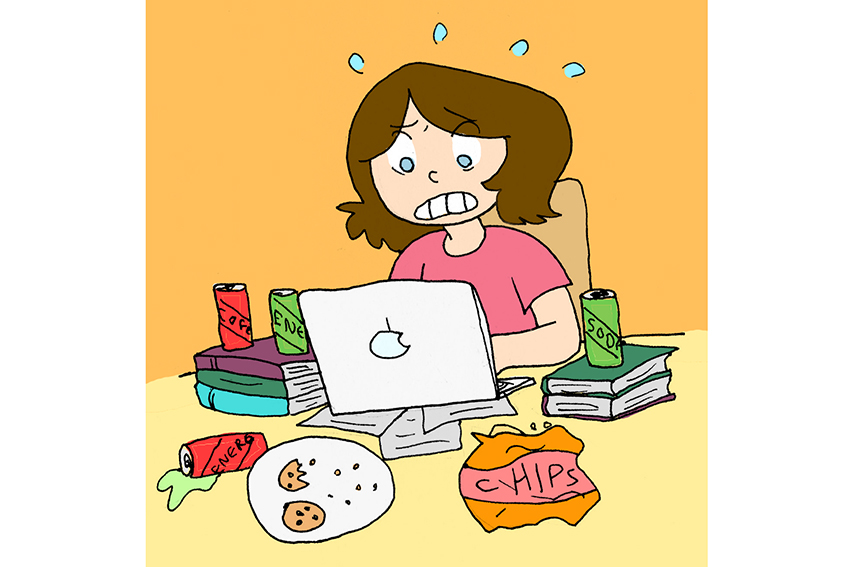I have five exams next week and need to go buy some study snacks. What do you recommend?
—Straight-A Snacker
Students deal with the stress of finals in many ways. Some stress-eat, others forget refuel completely. Regardless of your exam week habits, it’s important to remember that nutrition plays a vital role in cognitive function. The snacks you eat — or don’t eat — during study hours can make you smarter without even cracking a book.
I’ll start my advice with how you should start your day: breakfast. Several studies show that breakfast improves short-term memory and alertness, according to the journal Medicine. You also won’t have a growling stomach in the quiet library, which might distract you and your study buddies.
Breakfast is important, but you can’t consume just anything. Scientists have found that whole grains are positively associated with test scores in elementary-aged students, whereas juices lead to lower scores, according to an article in the Journal of the American College of Nutrition. And let’s be honest — we’re not that different than elementary students. Oatmeal or whole wheat toast are good options — pass on the OJ.
Even if you’re not studying for biochemistry, take some time to think about omega-3 fatty acids. These essential fats not only sound intelligent, but they also play a role in brain activity. DHA, a certain type of omega-3, is highly concentrated in the brain, according to the Journal of Biomedical Science. DHA helps create synapses, transmit messages between neurons and aid in learning processes.
A study found that omega-3 fatty acid consumption in students from ages six to 16 was positively related to cognitive performance, according to Frontiers in Evolutionary Neuroscience. This same paper suggests that the high intake of omega-3 fatty acids in Eastern countries could attribute to their higher scores in
international testing.
DHA is mostly found in fatty fish, such as salmon and mackerel, but your friends would probably prefer you eat it outside of the lecture hall. Algae is another source — the seaweed wrapped around sushi counts! Talk to a doctor or registered dietitian before taking supplements.
If surf and turf isn’t your thing, think about incorporating more blueberries, blackberries and strawberries in your diet. Berries are high in anthocyanidins, naturally occurring compounds found in some fruits and veggies. Not only do anthocyanidins provide pretty hues — they are the pigments that give plants their color — but they are also able to cross the blood-brain barrier and settle in areas of the brain that affect learning and memory, according to Annals of Neurology. A study published in the British Journal of Nutrition showed that a berry-supplemented diet improves working memory and the growth and development of nervous tissue. Now that’s berry cool!
Knowing which foods to steer clear of can be just as beneficial. Say no to saturated fats and sugar — rodents that received high-sugar and high-saturated fat diets scored lower on memory and retention tests than those that received a low-fat, complex-carbohydrate based diet, according to a study published in Physiology & Behavior.
Pizza and cheese are the largest saturated fat sources in America, according to the Harvard School of Public Health. Like anything else, these foods are fine in moderation, but consider other options before ordering a late-night pizza delivery to the PCL.
My final word of wisdom: Stay away from energy drinks. You may be buzzed for an hour or so, but the sugar will zap your energy in the long run. The high sugar content in many energy drinks also increases the risk for obesity and Type 2 diabetes, according to the International Journal of Health Sciences. The even larger concern is the stress put on your heart — excessive energy drink consumption has been associated with chest pain, increased heart rate and irregular heartbeat, according to the American Academy of Nurse Practitioners.
Study smarter, not harder — fueling your brain is crucial for finals. Study up on these foods, and you may just score yourself an A.















